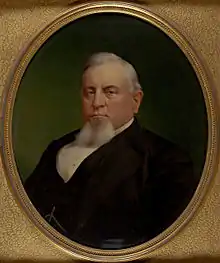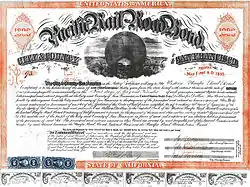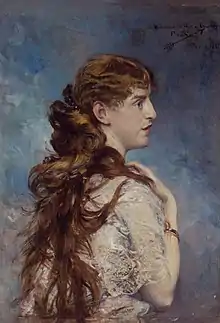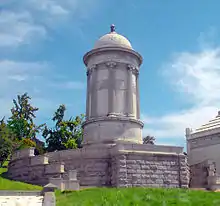Charles Crocker
Charles Crocker (September 16, 1822 – August 14, 1888) was an American railroad executive who was one of the founders of the Central Pacific Railroad, which constructed the westernmost portion of the first transcontinental railroad, and took control with partners of the Southern Pacific Railroad.[2]
Charles Crocker | |
|---|---|
 c. 1872 by Stephen W. Shaw | |
| Born | September 16, 1822 Troy, New York, U.S. |
| Died | August 14, 1888 (aged 65) Monterey, California, U.S. |
| Net worth | $20 million at death in 1888 (1/608th of U.S. GNP)[1] |
| Political party | Republican |
| Spouse(s) | Mary Ann Deming
(m. 1852; died 1887) |
| Children | 6, including Charles, George, William |
| Relatives | Edwin B. Crocker (brother) Harry Crocker (grand-nephew) |
Early years
Crocker was born in Troy, New York on September 16, 1822.[2] He was the son of Eliza (née Wright) and Isaac Crocker, a modest family. They joined the nineteenth-century migration west and moved to Indiana when he was 14, where they had a farm. Crocker soon became independent, working on several farms, a sawmill, and at an iron forge.[2]
At the age of 23, in 1845, he founded a small, independent iron forge of his own. He used money saved from his earnings to invest later in the new railroad business after moving to California, which had become a boom state since the Gold Rush. His older brother Edwin B. Crocker had become an attorney by the time Crocker was investing in railroads.[3]
Founding a railroad


_Charles_Crocker's_Residence%252C_San_Franciscoca._1880_SFMOMA.jpg.webp)
In 1861, after hearing an intriguing presentation by Theodore Judah, he was one of the four principal investors, along with Mark Hopkins, Collis Huntington and Leland Stanford (also known as The Big Four), who formed the Central Pacific Railroad, which constructed the western portion of the First Transcontinental Railroad in North America. His position with the company was that of construction supervisor and president of Charles Crocker & Co., a Central Pacific subsidiary founded expressly for the purpose of building the railroad.
Crocker bought train plows to plow the tracks of snow through the mountains, but they derailed due to ice on the tracks. He had more than 40 miles (65 km) of snow sheds built to cover the tracks in the Sierra Nevada mountains, to prevent the tracks from getting covered with snow in the winter. This project cost over $2 million.[5]
In 1864, Charles asked his older brother Edwin to serve as legal counsel for the Central Pacific Railroad.[3]
While the Central Pacific was still under construction in 1868, Crocker and his three associates acquired control of the Southern Pacific Railroad. It built the westernmost portion of the second transcontinental railroad. Deming, New Mexico, is named after his wife, Mary Ann Deming Crocker. A silver spike was driven here in 1881 to commemorate the meeting of the Southern Pacific with the Atchison, Topeka and Santa Fe railroads, completing the construction of the second transcontinental railroad in the United States.[6] On September 5, 1876 at the Lang Southern Pacific Station, a California Historic Landmark, Crocker hammered a golden spike into a railroad tie, the ceremonial spike was d to celebrate the completion of San Joaquin Valley rail line. The completion of the line connected the City of Los Angeles with San Francisco and First Transcontinental Railroad line.[7]
Banking
Crocker was briefly the controlling shareholder of Wells Fargo in 1869 and served as president. After he sold down, he was replaced by John J. Valentine, Sr..[8] Crocker also acquired controlling interest for his son William in Woolworth National Bank, which was renamed Crocker-Anglo Bank.
In 1963, Crocker-Anglo Bank merged with Los Angeles' Citizens National Bank, to become Crocker-Citizens Bank[9] and later, Crocker Bank. The San Francisco-based bank no longer exists, as it was acquired by Wells Fargo in 1986.[10][11]
Nob Hill and the 40 foot tall spite fence
Crocker built a mansion on Nob Hill. When his attempts to buy out Mr. Nicholas Yung from his property were rebuffed, he built a 40-foot spite fence around three sides of the neighbor's property. Legal challenges to the fence were unavailing. The feud lasted many years, and the fence was only removed after the death of Mrs. Yung, and the sale of the property by Yung's heirs to Crocker's family. Spite fences were thereafter made illegal in San Francisco. The mansion was destroyed in the 1906 San Francisco earthquake. Though the disaster rendered the infamous dispute and its resolution moot, Crocker's family donated the entire block of land to charity, in support of the Episcopal Diocese of California.[12] In 1910, in the same plot where the fence stood, the cornerstone was laid for Grace Cathedral.[13]
Personal life

In 1852, Crocker was married to Mary Ann Deming (1827–1889).[14] Mary was the daughter of John Jay Deming and Emily (née Reed) Deming. Together, they had six children, four of whom survived to adulthood:[15]
- Charles Frederick Crocker (1854–1897), who married Jennie Ella Easton (1858–1887).[16][17]
- George Crocker (1856–1909), who married Emma Hanchett (1855–1904).[18][19]
- Harriet Valentine Crocker (1859–1935), who married Charles Beatty Alexander (1849–1927).[20][21]
- William Henry Crocker (1861–1937), who married Ethel Sperry (1861–1934).[22]
Crocker was seriously injured in a New York City carriage accident in 1886,[23] never fully recovered, and died two years later on August 14, 1888.[24][2] He was buried in a mausoleum located on "Millionaire's Row" at Mountain View Cemetery in Oakland, California. The massive granite structure was designed by the New York architect A. Page Brown, who later designed the San Francisco Ferry Building.[25][26] Crocker's estate has been valued at between $300 million and $400 million at the time of his death in 1888.

Descendants
Through his son Charles, he was the grandfather of Mary Crocker (1881–1905), who married U.S. Congressman Francis Burton Harrison; Charles Templeton Crocker (1884–1948); and Jennie Adeline Crocker (1887–1974).[27]
Through his daughter Harriet, he was the grandfather of Mary Crocker Alexander (1895–1986), who married diplomat Sheldon Whitehouse.[28] Their son was Charles Sheldon Whitehouse (1921–2001), the United States Ambassador to Laos and Thailand,[29] and their grandson, Crocker's great-great-grandson, is U.S. Senator Sheldon Whitehouse of Rhode Island.[29]
Through his son William, he was the grandfather of Charles Crocker, William Willard Crocker, Helen Crocker (Russell) and Ethel Mary Crocker (de Limur).[22]
Family tree
| Family of Charles Crocker | |||||||||||||||||||||||||||||||||||||||||||||||||||||||||||||||||||||||||||||||||||||||||||||||||||||||||||||||||||||||||||||||||||||||||||||||||||||||||||||||||||||||||||||||||||||||||||||||||||||||||||||||||||||||||||||||||||||||||||||||||||||||||||||||||||||||||||||||||||||||||||||||||||||||||||||||||||||||||||||||||||||||||||||||||||||||||||||||||||||||||||||||||||||||||||||||||||||||||||||||||||||||||||||||||||||||||||||||||||||||||||||||||||||||||||||||||||||||||||||||||||||||||||||||||||||||||||||||||||||||||||||||||||||||||||||||||||||||||||||||||||||||||||||||||||||||||||||||||||||||||||||||||||||||||||||||||||||||||||||||||||||||||||||||||||||||||||||||||||||||||||||||||||||||||||||||||||||||||||||||||||||||||||||||||||||||||||||||||||||||||||||||||||||||||||||||||||||||||||||||||||||||||||||||||||||||||||||||||||||||||||||||||||||||||||||||||||||||||||||||||||||||||||||||||||||||||||||||||||||||||||||||||||||||||||||||||||||||||||||||||||||||||||||||||||||||||||||||||||||||
|---|---|---|---|---|---|---|---|---|---|---|---|---|---|---|---|---|---|---|---|---|---|---|---|---|---|---|---|---|---|---|---|---|---|---|---|---|---|---|---|---|---|---|---|---|---|---|---|---|---|---|---|---|---|---|---|---|---|---|---|---|---|---|---|---|---|---|---|---|---|---|---|---|---|---|---|---|---|---|---|---|---|---|---|---|---|---|---|---|---|---|---|---|---|---|---|---|---|---|---|---|---|---|---|---|---|---|---|---|---|---|---|---|---|---|---|---|---|---|---|---|---|---|---|---|---|---|---|---|---|---|---|---|---|---|---|---|---|---|---|---|---|---|---|---|---|---|---|---|---|---|---|---|---|---|---|---|---|---|---|---|---|---|---|---|---|---|---|---|---|---|---|---|---|---|---|---|---|---|---|---|---|---|---|---|---|---|---|---|---|---|---|---|---|---|---|---|---|---|---|---|---|---|---|---|---|---|---|---|---|---|---|---|---|---|---|---|---|---|---|---|---|---|---|---|---|---|---|---|---|---|---|---|---|---|---|---|---|---|---|---|---|---|---|---|---|---|---|---|---|---|---|---|---|---|---|---|---|---|---|---|---|---|---|---|---|---|---|---|---|---|---|---|---|---|---|---|---|---|---|---|---|---|---|---|---|---|---|---|---|---|---|---|---|---|---|---|---|---|---|---|---|---|---|---|---|---|---|---|---|---|---|---|---|---|---|---|---|---|---|---|---|---|---|---|---|---|---|---|---|---|---|---|---|---|---|---|---|---|---|---|---|---|---|---|---|---|---|---|---|---|---|---|---|---|---|---|---|---|---|---|---|---|---|---|---|---|---|---|---|---|---|---|---|---|---|---|---|---|---|---|---|---|---|---|---|---|---|---|---|---|---|---|---|---|---|---|---|---|---|---|---|---|---|---|---|---|---|---|---|---|---|---|---|---|---|---|---|---|---|---|---|---|---|---|---|---|---|---|---|---|---|---|---|---|---|---|---|---|---|---|---|---|---|---|---|---|---|---|---|---|---|---|---|---|---|---|---|---|---|---|---|---|---|---|---|---|---|---|---|---|---|---|---|---|---|---|---|---|---|---|---|---|---|---|---|---|---|---|---|---|---|---|---|---|---|---|---|---|---|---|---|---|---|---|---|---|---|---|---|---|---|---|---|---|---|---|---|---|---|---|---|---|---|---|---|---|---|---|---|---|---|---|---|---|---|---|---|---|---|---|---|---|---|---|---|---|---|---|---|---|---|---|---|---|---|---|---|---|---|---|---|---|---|---|---|---|---|---|---|---|---|---|---|---|---|---|---|---|---|---|---|---|---|---|---|---|---|---|---|---|---|---|---|---|---|---|---|---|---|---|---|---|---|---|---|---|---|---|---|---|---|---|---|---|---|---|---|---|---|---|---|---|---|---|---|---|---|---|---|---|---|---|---|---|---|---|---|---|---|---|---|---|---|---|---|---|---|---|---|---|---|---|---|---|---|---|---|---|---|---|---|---|---|---|---|---|---|---|---|---|---|---|---|---|---|---|---|---|---|---|---|---|---|---|---|---|---|---|---|---|---|---|---|---|---|---|---|---|---|---|---|---|---|---|---|---|---|---|---|---|---|---|---|---|---|---|---|---|---|---|---|---|---|---|---|---|---|---|---|---|---|---|---|---|---|---|---|---|---|---|---|---|---|---|---|---|---|---|---|---|---|---|---|---|---|---|---|---|---|---|---|---|---|---|---|---|---|---|---|---|---|---|---|---|---|---|---|---|---|---|---|---|---|---|---|---|---|---|---|---|---|---|---|---|---|---|---|---|---|---|---|---|---|---|---|---|---|---|---|---|---|---|---|---|---|---|---|---|---|---|---|---|---|---|---|---|---|---|---|---|---|---|---|---|---|---|---|---|---|---|---|---|---|---|---|---|---|---|---|---|---|---|---|---|---|---|---|---|---|---|---|---|---|---|---|---|---|---|---|---|---|---|---|---|---|---|---|---|---|---|---|---|---|---|---|---|---|---|---|---|---|---|---|---|---|---|---|---|---|---|---|---|---|---|---|---|---|---|---|---|---|---|---|---|---|---|---|---|---|---|---|---|---|---|---|---|---|---|---|---|---|---|---|---|---|---|---|---|---|---|---|---|---|---|---|---|---|---|---|---|---|---|---|---|---|---|---|---|---|---|---|---|---|---|---|---|---|---|---|---|---|---|---|---|---|---|---|---|---|---|---|---|---|---|---|---|---|---|---|---|---|---|---|---|---|---|---|---|---|
| |||||||||||||||||||||||||||||||||||||||||||||||||||||||||||||||||||||||||||||||||||||||||||||||||||||||||||||||||||||||||||||||||||||||||||||||||||||||||||||||||||||||||||||||||||||||||||||||||||||||||||||||||||||||||||||||||||||||||||||||||||||||||||||||||||||||||||||||||||||||||||||||||||||||||||||||||||||||||||||||||||||||||||||||||||||||||||||||||||||||||||||||||||||||||||||||||||||||||||||||||||||||||||||||||||||||||||||||||||||||||||||||||||||||||||||||||||||||||||||||||||||||||||||||||||||||||||||||||||||||||||||||||||||||||||||||||||||||||||||||||||||||||||||||||||||||||||||||||||||||||||||||||||||||||||||||||||||||||||||||||||||||||||||||||||||||||||||||||||||||||||||||||||||||||||||||||||||||||||||||||||||||||||||||||||||||||||||||||||||||||||||||||||||||||||||||||||||||||||||||||||||||||||||||||||||||||||||||||||||||||||||||||||||||||||||||||||||||||||||||||||||||||||||||||||||||||||||||||||||||||||||||||||||||||||||||||||||||||||||||||||||||||||||||||||||||||||||||||||||||
References
- Klepper, Michael; Gunther, Michael (1996), The Wealthy 100: From Benjamin Franklin to Bill Gates—A Ranking of the Richest Americans, Past and Present, Secaucus, NJ: Carol Publishing Group, p. xiii, ISBN 978-0-8065-1800-8, OCLC 33818143
- "Obituary. Charles Crocker". The New York Times. August 15, 1888. Retrieved April 4, 2018.
- "People & Events: Edwin Bryant Crocker (1818-1875)". Public Broadcasting Service. 1999–2003. Retrieved March 17, 2011.
- "Home|Verdi History". Verdi History Preservation Society, Inc. Retrieved August 11, 2020.
- "Charles Crocker", The West', PBS-WETA
- "Deming, NM (DEM)". Great American Stations. Retrieved August 11, 2020.
- "CHL # 590 Lang Southern Pacific Station Los Angeles". www.californiahistoricallandmarks.com. Retrieved August 11, 2020.
- Fradkin, Philip L. (2002). Stage Coach, The History of Wells Fargo. ISBN 978-0-7432-2762-9.
- "Banking: The Urge to Unrmerge". Time. August 27, 1965. Retrieved April 28, 2010.
- "Wells Fargo to acquire Crocker National Corp". Eugene Register-Guard. (Oregon). Associated Press. February 8, 1986. p. 12C.
- "Wells Fargo acquires Crocker". Pittsburgh Post-Gazette. April 30, 1986. p. 16.
- Rosse, Jake. "The Man Who Built a 40-Foot Spite Fence Around His Neighbor's Home". Pocket worthy: Stories to fuel your mind. Mental Floss. Retrieved May 2, 2020.
When Nicholas Yung wouldn't sell his land to railroad baron Charles Crocker, Crocker built a 40-foot fence around his house and blotted out the sun.
- "History". Grace Cathedral. March 7, 2016. Retrieved May 3, 2020.
- "Home". Mary A. Crocker. Retrieved July 24, 2019.
- "Charles Crocker's Will". The New York Times. August 30, 1888. Retrieved April 4, 2018.
- "C. F. Crocker Dead. Vice President of the Southern Pacific Railway Expires in San Mateo, California". The New York Times. July 18, 1897. Retrieved February 9, 2010.
Col. Charles F. Crocker, Vice President of the Southern Pacific Railway Company, died at his home here to-night.
(subscription required) - "Clasped in the Arms of Death". San Francisco Call. 82 (48). July 18, 1897. Retrieved February 9, 2017.
-
"Geo. Crocker Dying, a Victim of Cancer; Long a Sufferer from the Same Disease That Killed His Wife in 1904. Call His Brother Home - William H. Crocker Hastens from Europe -- $6,000,000 Inheritance Won By Five Years' Fight Against Drink". The New York Times. New York City, New York. November 17, 1909. Retrieved April 14, 2017.
 This article incorporates text from this source, which is in the public domain.
This article incorporates text from this source, which is in the public domain. - "George Crocker Dies of Cancer". The New York Times. New York City, New York. December 5, 1909. p. 13. Retrieved April 14, 2017.
 This article incorporates text from this source, which is in the public domain.
This article incorporates text from this source, which is in the public domain. - "MISS ALEXANDER TO WED S. WHITEHOUSE; Daughter of Mr. and Mrs. Charles B. Alexander Engaged to Diplomatist. FIANCEE NOW IN EUROPE Mr. Whitehouse Is Chief of the New Eastern Division, Department of State". The New York Times. July 30, 1920. Retrieved January 24, 2018.
- Lawrence Kestenbaum. "Index to Politicians: Whitehouse". The Political Graveyard. Retrieved June 17, 2013.
- "W. H. Crocker Dies, Banker On Coast". The New York Times. September 26, 1937. Retrieved June 13, 2018.
- "Thrown from His Wagon.; Millionaire Crocker Seriously Hurt While Driving". The New York Times. April 21, 1886. Retrieved April 4, 2018.
- "Charles Crocker Dying". The New York Times. August 12, 1888. Retrieved April 4, 2018.
- "The Tombs of Charles Crocker etal". Central Pacific RR Photographic Museum.
- "For May Day, Remembering Vincent St. John". LaborStandard.org. Archived from the original on December 9, 2015. Retrieved January 14, 2007. Use "Crocker" as the search text.
- "Crocker, Noted Scientist, Dies In Home At SF". Madera Tribune (113). U.P. December 13, 1948. Retrieved February 9, 2017.
- "Mary Whitehouse, 90, Leader of Civic Groups". The New York Times. January 24, 1986. Retrieved January 24, 2018.
- Lewis, Paul (July 1, 2001). "Charles S. Whitehouse, 79, Diplomat and C.I.A. Official". The New York Times. Retrieved January 24, 2018.
External links
| Wikimedia Commons has media related to Charles Crocker. |
- Ambrose, Stephen E. (2000). Nothing Like It In The World; The men who built the Transcontinental Railroad 1863-1869. Simon & Schuster. ISBN 0-684-84609-8.
